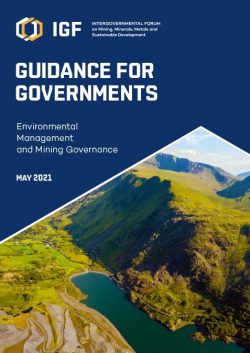The Intergovernmental Forum on Mining, Minerals, Metals and Sustainable Development (IGF) has released a new Guidance for Governments: Environmental Management and Mining Governance.
“Environmental management is a critical part of good governance in the mining sector,” said Alec Crawford, Senior Policy Advisor with the IGF and co-author of the new guidance.
“Governments have an important role to play when it comes to managing water resources, protecting biodiversity and ecosystems, storing mine waste, and preparing for and responding to emergencies.”
“Successful environmental management across the mine life cycle depends on strong legal frameworks, regulations, and policies,” Crawford said.
The new guidance helps governments by:
- Outlining key issues relating to water management, biodiversity protection, mine waste management, and emergency preparedness and response in the mining sector.
- Highlighting the good international standards and practices used by governments and companies to support strong environmental management.
- Describing what governments must do to protect the environment across the mine life cycle: before, during, and after mining.
The report draws from the IGF’s Mining Policy Framework (MPF) and highlights the key issues, benchmarks, and standards in four main areas of environmental management in mining—water, biodiversity, waste, and emergency preparedness and response—and governments’ role in ensuring that each is managed in support of sustainable development.
The IGF supports more than 75 member nations committed to leveraging mining for sustainable development to ensure negative impacts are limited and financial benefits are shared. It is devoted to optimizing the benefits of mining to achieve poverty reduction, inclusive growth, social development, and environmental stewardship. The International Institute for Sustainable Development has served as Secretariat for the IGF since October 2015. Core funding is provided by the Governments of Canada and the Netherlands.


